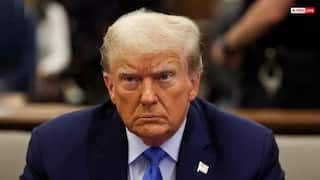India Proposes 15% Retaliatory Duties On 22 Items Imported From UK Against Curbs On Steel Products
India said the safeguard measures taken by the UK on steel products have resulted in the decline of exports to the tune of 2,19,000 tonnes on which the duty collection would be $247.7 million.

New Delhi: India has proposed additional customs duties of 15 per cent on the import of 22 products, including whiskey, cheese and diesel engine parts, from the UK in retaliation to Britain's decision to impose restrictions on steel products. In a communication to the World Trade Organisation (WTO), India said it is estimated that the safeguard measures taken by the UK on steel products have resulted in the decline of exports to the tune of 2,19,000 tonnes on which the duty collection would be USD 247.7 million.
Accordingly, India's proposed suspension of concessions would result in an equivalent amount of duty collected from products originating in the UK, it said.
"India hereby notifies the (WTO's) Council for Trade in Goods of its decision to suspend concessions or other obligations under the General Agreement on Tariffs and Trade 1994 and the Agreement on Safeguards that are substantially equivalent to the amount of trade affected by the measures of the UK," it added.
The other products include processed cheese, scotch, blended whiskey, gin, animal feed, liquified propane, some essential oils, beauty preparations, cosmetic and toilet preparations, unsorted diamonds, silver, platinum, semi-diesel engine parts, unwrought gold, turbo jets, and certain electric conductors.
India's average imports of semi-manufactured silver from the UK stood at USD 412.68 million. The figure stood at USD 275.22 million for certain silver goods and USD 51.03 million for blended whiskey.
The communication also said that the proposed suspension of concessions would be in the form of an increase in duty on the selected products originating in the UK.
"The suspension of concessions and other obligations will continue to apply until the safeguard measures of the UK are lifted," it said, adding "India wishes to clarify that suspension of concessions will be equivalent to the amount of trade affected by the UKs' measures".
The measures imposed by the UK consist of tariff-rate quotas imposed on 15 steel product categories with an out-of-quota duty of 25 per cent.
Both the countries held consultations on August 5 virtually to discuss the extensions of the safeguard by the UK on certain steel products, originally applied by the European Union.
On September 1, India proposed to impose retaliatory customs duties under the WTO norms on about USD 250 million worth of goods imported from the UK if no agreement is reached on compensation in a case concerning the imposition of restrictions by Britain on steel products.
India has raised concerns at the World Trade Organisation (WTO) over the UK's move.
New Delhi has stated that it has substantial trade interest in the sector.
According to an earlier communication of the WTO, India had submitted its concerns to the UK regarding the manner in which safeguard measures have been extended, which is violative of the global trade provisions and the WTO's Agreement on Safeguards.
India had requested compensation under the agreement.
Last year, New Delhi has also proposed similar measures against the European Union (EU) under the aegis of the WTO against a move of the 28-nation bloc to impose safeguard duties on certain steel products.
In 2018, India imposed retaliatory customs duties on certain American goods against their move to impose high customs duties on certain steel and aluminium products.
The WTO is a Geneva-based, 164-member global body which frames rules and norms for exports and imports and adjudicates trade disputes among member countries.
India is negotiating a free trade agreement with the UK, talks for which are expected to conclude anytime soon.
The bilateral trade has increased to USD 17.5 billion in 2021-22 compared to USD 13.2 billion in 2020-21. India's exports stood at USD 10.5 billion in 2021-22, while imports were USD 7 billion.
Related Video
Union Budget 2025: Arvind Kejriwal lists the shortcomings of the Modi government's budget | ABP News | AAP





































